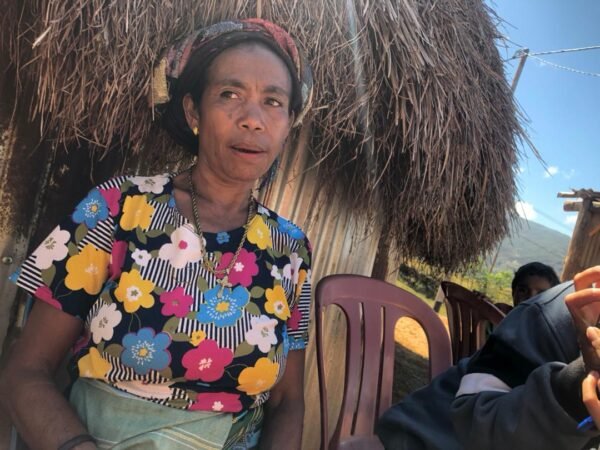Letefoho, November 29, 2024 (Média Democracia) – The Leubasa, Lauana community experienced a decline in coffee production due to the lack of rainwater which had an impact on the coffee trees and resulted in a long dry season which resulted in the death of coffee plants and other plants that protect the coffee which is fir trees.
Domingas da Silva said this year’s coffee crop did not produce as much fruit as usual, due to late rains.
“There is coffee that bears fruit and there is also coffee that does not, because this year the rain came late so that cassava and others could not grow well, a long summer is good if like now the rain has just fallen then the coffee does not bear fruit, it only produces leaves, if it is exposed to sunlight longer then the coffee can bear a little fruit,” She said.
She informed that in 1970 the rain came on time, but starting in 2000 the rain started coming late.
“Compare it with the previous rain, it came on time, and we could get a little food, in 2000 the rain was not on time, and food was also hard to get, and the crops in the rice fields did not grow well, such as corn, peanuts, cassava and others, when it rains like this we start to borrow money and only pay it back after the coffee harvest,” She said.
She added that this year the price of coffee was good but the income were not so, so the coffee yield was not much because of the long summer, so the fir trees that provided shelter for the coffee died and some fell down because of the strong winds.
President of the Village and Sub-village of Klibur Komunidade Dezenvolvimentu, Francisco Maia Baptista said that the current climate change has seen coffee in the highlands produce poorly due to the lack of rainwater.
“Currently, we see that coffee in the highlands cannot produce well because of the long summer because it does not get food and water from the soil so that everything can die, a long summer like this if it rains can flower but cannot bear fruit,” he said.
He continued, the coffee did not produce fruit because the rain was late from the time the coffee fruited, so that the nutrients from the rain only flowed to the leaves.
“Nutrients that only flow to the leaves make coffee not produce well, so that it is detrimental to the community when the coffee harvest becomes less, so they do not get income from coffee that can be sold on the market,” he said.
He emphasized that if coffee is not produced properly, it will have an impact on decreasing the income of coffee farmers and they will not be able to support their families.
“So, we can see that parents are economically disadvantaged so they cannot pay for their children’s school and also they cannot do their daily activities anymore because they are affected by the long summer. However, not only coffee is affected, other plants such as cassava, potatoes, peanuts, and corn are also affected. The plants should have been able to grow well by now, but because of the long summer, the production is not good.” He added.
He made a comparison of rainfall several years ago, starting in 2023, rainfall came earlier, making coffee production better than this year.
“We compare it to a few years ago when the rain came earlier, we can say that our coffee could reach 25% and provide benefits to the community, but this year we see that the rain came late so that the coffee could not produce well because the rain came late and the wind was strong, this has an impact on coffee in the highlands, rain may fall but the coffee cannot bear fruit anymore, when the coffee harvest time comes, the coffee will decrease,” he added.
He added that if the rain came earlier in September, the coffee could bear fruit, but this year the rain came late, resulting in a decline in coffee production.
“If in September it rains even though it is only for two days but the coffee can bear fruit, now we see that on October 6 the rain just fell, so the coffee only flowers, strong winds and long summers make the coffee unable to bear fruit, like now on November 16 it rains heavily but the coffee cannot bear fruit because it is too late,” he added.
He informed that the majority of the villagers used pine trees to plant coffee compared to samtuku trees.
“Here, many people use pine trees, but when it’s hot and windy, the pine trees fall down, damaging the coffee plants in the fields,” he said.
He recommended that MAPPF monitor community coffee in the fields so that they can offer coffee plants to be planted in the coffee fields because some of the trees in the fields are starting to age and die due to the impact of the long hot season.
In addition, this information was obtained by journalists when participating in Media Tour activities because AJTL collaborated with Oxfan in Timor-Leste which received financial support from Oxfam Hong Kong.
Reported by : Estefania
Picture by : Estefania

